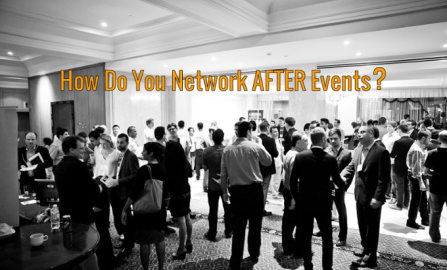We’ve all read articles about networking best practices. The internet is overwrought with networking angles and strategies advocating for the best ways to stay in front of your contacts and prospects amidst the noise of a digitally connected world.
So Then…Why Is This Business Networking Article Valuable?
I don’t propose that you reinvent the wheel, or require massive amounts of habit changing behavior. This article simply requires a small (but powerful) shift in thinking in order for you to nurture business relationships in the most optimal manner possible.
Shift Happens
Replace the word networking with the word engagement.
Now, take a moment to read that last sentence again. This time, focus on the difference in mindset that this shift is asking you to make.
Why This Mindset Shift is Crucial to Your Business Success
By thinking of networking in terms of engagement, the focal point shift from compiling contacts to maximizing outreach. When we put our attention on making specific connections that support our business success, we naturally steer away from compiling contacts (connections, followers, friends) for the sole purpose of obtaining a large number of contacts.
To put it another way, our targeted messaging will reach more referral-centric ears when we prioritize quality over quantity in our greater professional network.
These days, everyone has a huge network of connections. We meet people at personal and professional events like conferences, meetups, weddings, school functions, and so on. Many of us are such great networkers that we can even meet people while waiting in line for coffee, lunch, or the commuter train. Yes, people are everywhere. Not surprisingly, this plethora of people has led to the (unfortunate) grab-and-go networking mindset wherein we try to include every single person we meet into our network-at-large.
But does this practice truly add value to our networks?
I’d argue that by casting such a wide net, we miss out on nurturing our most valuable connections: those that will generate leads via referrals. But I’ll conquer that issue in an upcoming post (so subscribe to this blog and stay tuned!).
The point is: whether your network is huge or filtered down to include only the most referral-centric contacts, you must stay top-of-mind in order to be remembered for who you are and what you have to offer.

Active Versus Passive Engagement
Our networks can help us achieve our various goals. We should be building relationships to that end. But with so many varying opinions about how to do that effectively, we must first choose what our goals then engage our networks accordingly. That’s why the importance of being specific can’t be overstated when talking about network engagement. When we get specific with our goals, we actually make a direct impact on our own ability to be successful.
6 Ways to Stay Active
- Help: When we give, we become a valuable asset to our network. Our connections will form a powerful sense of our lasting commitment to them when we do things like share inspiring stories, help someone find a job, fundraise for a charitable cause, or connect people with each other.
- Video: Videos get the most shares online. So use video to build online awareness of your personality whether you’re using Skype to live chat with current customers and potential leads, or YouTube to offer targeted and proprietary content.
- Face-to-Face: It’s powerful to meet in person. Coffee, lunch, and happy hour are the easiest ways to accomplish this, since everyone does at least one of these activities every day! But think beyond the basics here. For instance, if you play tennis, find out who else plays tennis in your network and invite them to play if they live nearby. Get a weekly or monthly match on your calendars. Same goes for live sporting events, industry meetups, and other opportunities to sit down with your connections. Get creative!
- Message: Do you know someone who plays tennis (or another sport), but they live far away? Write them an email, an actual letter that goes in the mail (remember those?!), or communicate with them on social media. Stay authentic by leveraging your favorite sports, news, interests, and so on with connections that share the same tastes.
- Comment: We are always skimming our social media feeds to stay current, so it’s an easy next step to comment on posts and shares that you feel passionate about. Just remember not to ostracize anyone by being overly opinionated or one-sided. The world is a tiny fishbowl when it comes right down to it. Don’t risk losing an opportunity because you felt the need to rant endlessly (Election 2016, anyone?).
- Post: Publish original content and relevant industry content on a regular basis. It’s up to you to decide what constitutes “regular,” but it’s good to keep in mind that posting several times a day is the best frequency for success. Remember to always publish helpful, informative content that raises awareness about your brand’s value and industry positioning. Create impact. Be a thought leader. Influence decisionmakers. You can do all of this with the right content.
4 Ways to Be Passive
- Share: Just like with posting, it’s important to share other people’s content in addition to your own content a few times a day. Again, keep your shares relevant and helpful to your network so that the content will resonate specifically with your connections. In between the bigger content shares (articles, white papers, eBooks, etc), make sure to share your business plans, ideals, and enthusiasm. That way, when the ask eventually happens, it won’t be a surprise to anyone.
- Like: This is by far the easiest way to show your connections some online love and attention. Check the social feeds of your alumni group(s), sales prospects, industry associations, vendors, and social interest groups on a daily basis. When you find a comment, share, or post that moves you, click the proverbial “like” button.
- View: Your time is valuable. So when you take the time to view someone’s website, social media feeds, webinar, blog, video of their keynote speech and the like, you’re increasing their online footprint while staying up-to-date about their corner of the fishbowl. From here, make sure you share, like, comment and so on.
- Tag: When you come across a piece of content in any of your social media feeds that you’d like to share with a specific connection, tag them! Here’s a “How To” article and infographic for every social media platform worth mentioning. Enjoy!
(82)
Report Post






